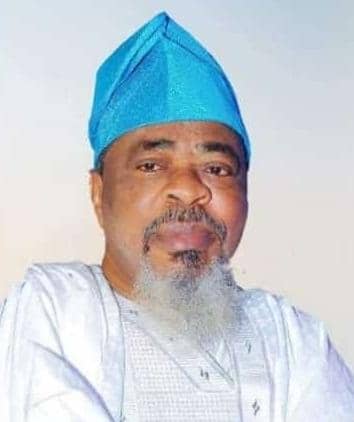
By Tayo Mabeweje
In the annals of Nigerian music history, Chief Femi Esho stands as a towering figure whose contributions transcend mere participation; he was a custodian, a preserver, and a promoter of Nigeria’s rich musical heritage. Born on October 29, 1946, in Ilesa, Osun State, Esho’s journey in music began with a passion that would eventually lead him to become one of the most revered names in the industry. His passing on June 17, 2024, marks the end of an era but also cements his legacy as a legendary figure in Nigerian music.
Chief Femi Esho was best known as the Chairman of Evergreen Musical Company, an entity synonymous with the preservation and promotion of Nigerian music. Under his leadership, Evergreen became a beacon for Nigerian music enthusiasts and a repository for timeless musical treasures. His vision was clear: to ensure that the sounds of Nigeria’s past were preserved for future generations. This vision was not just a professional endeavor but a personal mission that he pursued with unrelenting dedication.
The founding of the Evergreen Music Heritage Foundation was another milestone in Esho’s illustrious career. Through this foundation, he created a platform that not only preserved music but also educated the public about Nigeria’s musical history. The foundation has been instrumental in archiving thousands of recordings, ensuring that genres such as Highlife, Juju, Sakara, Apala, and Afrobeat remain accessible and appreciated. His work here was a testament to his foresight and commitment to cultural preservation.
Esho’s impact was perhaps most felt in the Highlife music scene, where he mentored numerous musicians. He provided guidance, support, and a wealth of knowledge that helped shape the careers of many artists. His role as a mentor was not confined to mere advice; he was deeply involved in nurturing talent, understanding the intricacies of the music, and fostering an environment where artists could thrive. His mentorship extended beyond technical skills to instilling a deep appreciation for the cultural significance of their work.
In a rapidly changing music industry, Chief Femi Esho was a stabilizing force, a guardian of tradition in a time of modernity. He understood the importance of evolving with the times while maintaining a firm grip on the roots of Nigerian music. This balance is evident in how he managed Evergreen Musical Company, blending the old with the new, and ensuring that each generation could find resonance in the music of the past.
The nickname “Baba Esho” or “Baba Musician” encapsulates the affection and respect that Esho commanded. He was more than a music executive; he was a father figure to many in the industry. His paternal approach to leadership and mentorship fostered a sense of community and continuity within the Nigerian music scene. He was always approachable, willing to share his wisdom, and ready to support emerging talents.
Esho’s contribution to the preservation of Nigerian music cannot be overstated. His efforts in archiving and promoting music have ensured that invaluable recordings from the past are not lost to time. He worked tirelessly to collect, restore, and archive recordings that might have otherwise disappeared, providing a cultural treasure trove for researchers, enthusiasts, and future musicians. This work has been crucial in keeping the sounds of Nigeria’s musical heritage alive and vibrant.
Beyond his professional achievements, Chief Femi Esho was known for his humility and kindness. Those who had the privilege of working with him often spoke of his generous spirit and his unwavering dedication to his work. His approachability and willingness to help others were traits that endeared him to many. He was a man who, despite his vast knowledge and experience, remained grounded and committed to his roots.
Chief Femi Esho’s legacy is also evident in the numerous awards and recognitions he received over the years. These accolades were a testament to his immense contributions to the music industry and his role in cultural preservation. Each award was not just a personal achievement but a recognition of the broader impact of his work on the Nigerian music landscape.
His work with the Lagos State Government before forming his musical company added another layer to his multifaceted career. This experience provided him with a unique perspective on the administrative and organizational aspects of cultural promotion. It was this blend of administrative acumen and musical passion that made him so effective in his later endeavors with Evergreen Musical Company and the Evergreen Music Heritage Foundation.
Chief Femi Esho’s passing leaves a void that will be deeply felt across the Nigerian music industry. His death at the age of 77 after a brief illness came as a shock to many who admired and respected him. Yet, his life and work remain a source of inspiration. He leaves behind a rich legacy that will continue to influence and shape Nigerian music for generations to come.
His life story is a powerful reminder of the importance of cultural preservation. In an age where traditional music often competes with contemporary sounds, Esho’s work highlights the need to remember and honor the past. His efforts ensure that Nigeria’s musical heritage remains a living, breathing part of the nation’s cultural identity.
As we reflect on Chief Femi Esho’s contributions, it is clear that his impact goes beyond music. He was a cultural ambassador, a mentor, and a guardian of Nigeria’s rich musical legacy. His work has left an indelible mark on the music industry, ensuring that the melodies and rhythms of Nigeria’s past will continue to resonate with future generations.
In mourning his loss, we also celebrate his life and the remarkable legacy he leaves behind. Chief Femi Esho’s dedication to preserving and promoting Nigerian music serves as a guiding light for all who value cultural heritage. His story is one of passion, dedication, and an unwavering commitment to his roots.
As we listen to the music he so diligently preserved, we are reminded of his life’s work and the cultural wealth he safeguarded. Chief Femi Esho’s legacy will continue to inspire and educate, reminding us of the power of music to connect us to our history and culture.
In conclusion, Chief Femi Esho was more than a music industry leader; he was a cultural custodian, a mentor, and a visionary. His contributions to the Nigerian music industry and his efforts in preserving the country’s musical heritage will be remembered and cherished for years to come. May his soul rest in peace, and may his legacy continue to resonate through the timeless music he so passionately preserved.
Tayo Mabeweje writes as a music researcher and commentator on Nigeria’s contemporary music.










